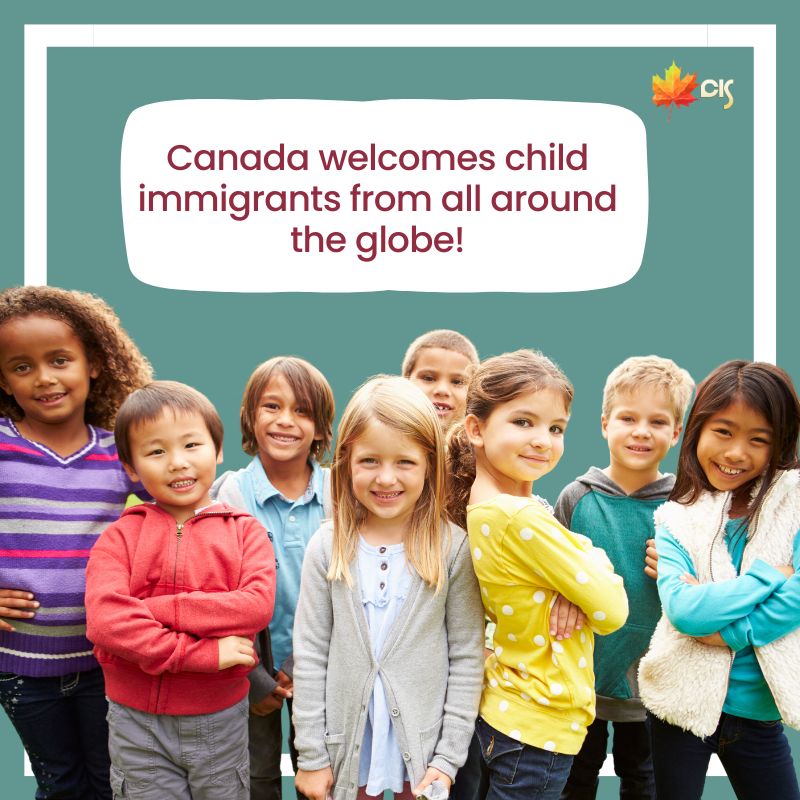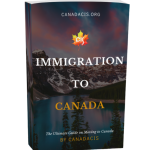Family Immigration to Canada: Moving with Children
Home » Blog » Immigration to Canada » Family Immigration to Canada: Moving with Children
Statistically speaking, 20% (50,000) of immigrants who enter Canada each year are children 15 years of age and below. About 15% of all immigrant children and youth are considered refugees, with about 1500 to 2000 brought in through international adoption.
In addition to this, 98,383 international students have arrived to study in Canada since 2011. It is common for Canada to accept immigrant children and welcome every one of them with open arms.
With that being said, as someone who plans to immigrate to Canada, you might be asking: “How do I relocate to Canada with my family?”
Well, the answer is quite simple. There are different Canada immigration programs that allows you to move to Canada with your loved ones, such as Express Entry and Family Sponsorship program!
Let’s know more about these programs as well as moving to Canada requirements, so keep on reading.
Table of Contents
📝 Family Relocation to Canada: Best Child Sponsorship Programs
There are two ways children can become a Canadian permanent resident and citizen, such as:
The Family Sponsorship program is a popular way to bring your child to Canada.
If you or a relative is considered a Canadian citizen or permanent resident, they can help the chosen dependent become a permanent resident through this program by sponsoring them. This pathway is a great option for moving to Canada with family.
Express Entry is available for skilled workers interested in applying for Canadian permanent residency through federal and specific provincial economic programs.
This program is the most common way for future sponsors to gain permanent residency.
This allows both sponsor and child to apply for permanent residency simultaneously.
Express Entry allows candidates to include their spouse and dependent children in their application, for an easier process of family immigration to Canada.
☑️ Requirements to Sponsor a Child for Canadian Immigration
For future and current sponsors who wish to bring their children into Canada, we’ve listed down a few qualifications and moving to Canada requirements you’ll need to consider:
The parent should be a Canadian citizen or permanent resident and at least 18 years of age.
You must agree to provide for all the dependent’s basic needs by signing and agreeing to provide financial support once the child becomes a permanent resident.
Sponsors will need to stay in Canada along with the child as long as they are permanent residents.
Canadian sponsors should file a sponsorship application.
Note: Once your child becomes a permanent resident, you can apply them for Canadian citizenship.
🌟 Hear Testimonials From Our Successful Immigration Clients!
Immigrating to Canada can bring a ton of opportunities, especially for families! However, the process of family relocation to Canada can be hard. But don’t worry! Our immigration experts here in CanadaCIS can help you! Watch the stories of our successful clients:





👶 Child Requirements to Be Sponsored for Immigration to Canada
As for the child, there are specific requirements they must meet. Here are some things you will need to consider for them to be approved as your dependant:
- The child should be under the age of 22 without a spouse or common-law partner
- The child is 22 years old or older, but they are financially, physically, or mentally incapable of supporting themselves
- The child should be your own for them to be eligible for your sponsorship
- If you have a child from your spouse who isn’t yours, the only way to sponsor them is by sponsoring your spouse as well

💰 The Cost of Raising a Child in Canada in 2026
Raising a child, let alone raising a child in a new country, is one of the most challenging things.
The responsibilities, the effort, the money, and the time spent on just one child is a huge commitment each parent should be willing to take.
Before packing your bags and taking that next one-way flight and grab the opportunity of family relocation to Canada with your little ones, we’d like to give you an estimate of how much it will cost to take care of your child in Canada.
Note: The total price stated above includes food, supplies, and educational expenses.
🛫 Moving to Canada with Children: What to Bring
Once your Canadian visa has been approved, there’s nothing else left but to get ready for your move!
We know the struggles of being a parent, and sometimes the preparation process of each move, whether out of town or out of the country, with children can be quite a hot mess.
So we’ve decided to lend a helping hand by prepping you in advance on what you’ll need to bring before your arrival to “The Great White North.”
Entertainment
Bring your child’s most precious toys, books, other cherished items (trust us, you’ll need it more than they do)
Clothing
Pack good winter clothes, including mittens, warm hats, and scarves
Important Documents
Valid passports of visa holder and all dependents. Children are also required to present any proof of identity, such as a birth certificate
Other Documents
Work permit (if necessary), Evidence of travel insurance, Address of your accommodation, Drivers license and other forms of valid government IDs
📺 Watch More Information About Moving to Canada
Canadian Immigration
🛬 Arriving in Canada with Children: What to Expect
After passing through immigration and customs, you can finally say that you’ve made it to Canada with your loved ones!
So what’s next? CanadaCIS has come up with a list of what to expect and the steps you should take during the first few weeks in Canada.
Expect to do a lot of researching and working on the administrative tasks in the first week.
Make sure to apply for your Social Insurance Numbers (SIN) and figure out what local schools or universities you’d like to register your child at.
You’ll most likely do a lot of exploring. Hence, it would be best if you took long walks around the neighborhood with your children so both you and your family could familiarize themselves with their new daily environment.
ALL provinces in Canada have amazing natural and indoor attractions!
What’s great about Canada is that there’s nothing to lose no matter what city you choose to live in.
It’s best to check out some local attractions during your first few weeks before both you and your children start school and work.
Treat your first few weeks as if you are on holiday.
Expect for culture shock to start kicking in after your first week, or even as early as the day you arrive.
Immigrant families should be able to adapt to the Canadian culture.
After all, it’s expected of you the minute you decided to apply for permanent residency.
Start to learn the ways of Canadian locals and teach them to your spouse and children.
It may take a long process to adapt to a new country, but Canada is a relatively easy country to adapt to.
Prepare to be sociable. Canadian’s are relatively friendly, so try making some new friends within the neighborhood.
You can start by taking your kids to the nearest park and starting conversations with other Canadian parents.
Take note that you should always say hello and address your name before approaching locals.
Heading to Canada with your children and staying for good is no joke. But with the help of immigration consultancies, you can make sure that your application process goes smoothly so that you can spend more time with your children and less time on immigration requirements. This can easily be done by reliable and top-rated Canada immigration experts such as CanadaCIS.
❓ Commonly Asked Questions About Bringing a Child to Canada
How much money do you need to immigrate to Canada?
Generally speaking, for just 1 person you will need about $12,960 Canadian dollars to immigrate to Canada.
Disclaimer: The total price provided above includes just the overall fees and cost of immigration to Canada without the cost of living, flights, etc.
How much money will you need to immigrate to Canada, depending on your family size?
Immigration prices and fees are typically based on the number of dependents.
We’ve provided a list below with the exact prices for each family size.
- 2 person family: $16,135
- 3 person family: $19,836
- 4 person family: $24,083
- 5 person family: $27,315
- 6 person family: $30,806
- 7 person family: $34,299
Note: If your family size goes beyond 7 people, you will need to pay an additional $3,492 per family member
What is the maximum age to immigrate to Canada?
Fortunately, there are no specific age requirements for any Canadian immigration program. Although applicants between the ages of 25 to 35 have received the maximum points in most economic immigration programs.
How to migrate with family to Canada?
- Check your eligibility to move to Canada.
- Choose the best immigration program suitable for you and your family with the help of CanadaCIS.
- Pay all applicable fees in full.
- Wait for your visa to arrive.
- Gather all required documents before moving, such as your immigrant visa, confirmation of permanent residence for each family member, valid passports, and other important documents.
How can a minor immigrate to Canada?
Immigrating to Canada as a minor can be daunting, but it doesn’t have to be complicated. We’ve provided the proper steps for you and your child to take note of when applying for Canadian immigration:
Step 1
Make sure the minor is eligible
Step 2
Gather documents
Step 3
Complete the immigration/visa application form and make sure to state that you will be adding your child as your dependent.
Step 4
Pay the fees
Step 5
Submit your application
Step 6
Wait for the results as the government processes the application
Step 7
Attend the Immigration Ceremony
Is Canada a good place to raise a family?
A million times, yes!
Canada is the perfect place to live in and most especially to raise a family!
The country is home to one of the most welcoming and multicultural economies in the world.
Not to mention, the entire country is flouring with breathtaking scenery and landscapes to enjoy with the whole family.
But what makes Canada the best country to raise a family is the low crime rates in most provinces, plenty of daycares to choose from, and extended maternity leave policies.












